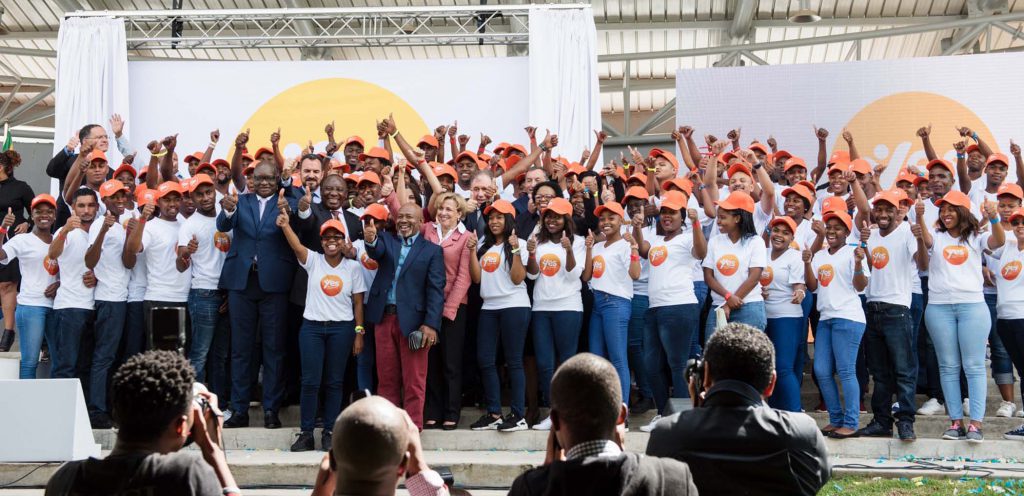Business Day Safety Safety and Security
The YES Generation
Just a month into his role as president of the Republic of South Africa, Cyril Ramaphosa took to the stage at the Riverside Incubation Hub near the Diepsloot township in Gauteng to launch a programme, which – he hopes – will be a defining feature of his tenure at the top.
The youth employment service, or “YES programme”, couldn’t be more needed. For millions of young South Africans, trying to find employment is the biggest struggle they are faced with on an ongoing basis. It’s no secret that the South African economy has taken a plunge in the last few years and jobs are scarce.
The tough economic climate the country finds itself in has seen the youth unemployment rate increase from 51.10% in the fourth quarter of 2017 to 52.40% in the first quarter of 2018.
Even where opportunities do exist, prospective employers often demand at least one year of work experience from candidates. This makes it even harder for young people who often lack work experience or are recent graduates who just left institutions of higher learning to land jobs.
YES, then, is designed to address this by means of a practical partnership between government, labour and business, which aims to use the funding, skills and organisation of businesses, the incentives and regulatory power of government, the cooperation of labour and the participation of communities to create a new set of opportunities for the youth to gain experience in the workforce.
It’s an opportunity to include marginalised youth from both urban and rural South Africa in the economy. The initiative hopes to provide more than one million young South Africans with paid work experience over the next three years.
How YES works
YES aims to place black unemployed youth into twelve-month, fixed-term work experiences with the hopes of increasing their chances of permanent employment after the programme. Initial reactions to the launch have been promising.
“With the high rate of youth unemployment and the need to prepare the young people for the world of work we can definitely benefit from this programme,” says Nelia Burger, training and development manager at Novus Academy, the training arm of printing and packaging firm Novus Holdings.
“The YES programme is a positive step in the right direction as it enables the very necessary transfer of workplace skills and integration into the workplace. The programme provides youth with a new opportunity that will prepare them for their future careers and the real world,” explains Burger.
The YES initiative plans to work with existing firms to create new job opportunities for the youth, and to improve the capacity of SMMEs with paid for youth labour and create new cohorts of SMMEs through creative value chain initiatives in collaboration with industry champions.
As an incentive, participating businesses will be eligible for a monthly reduction off PAYE via the employment tax incentive (ETI). Businesses will also qualify for a new youth employment Broad-Based Black Economic Empowerment (B-BBEE) recognition.
While some may wonder whether businesses should be incentivised to develop young talent, Richard Rayne, managing director of iLearn, thinks it’s a good thing. In his view, the proposed changes to the B-BBEE codes have made it very attractive for companies to meet the YES targets because there is a huge potential for improving their score by up to two levels.
“This is the rocket fuel the programme needs for it to gain proper traction and broad adoption,” says Rayne. “What is critical is that candidates are actually placed in decent work environments together with providing learning and development experiences to better equip them with the skills to perform their roles.”
Even though it’s too early to celebrate the programme, Rayne believes it has the potential to make a dent on youth unemployment and provide meaningful work for the country’s future working generation
Novus’ Burger welcomes YES, but she warns that some companies may experience challenges when it comes to the absorption of apprentices into the workplace once they have completed their training.
“Some companies may not necessarily be able to take on the extra overheads of the salary that would follow or have vacancies for such after they have completed the programme.”
In other words, there’s a lot of optimism around YES, but at a time when the country’s economic growth is slow or even negative, it’s still not going to be easy to find those lasting jobs.
Fast fact
330 000 YES jobs are hoped to be available in 2018, with 500 000 by mid-2019.
Corporate commitments coming
While there’s a hope small businesses will benefit, corporate South Africa has taken YES to its heart. Netcare, one of the flagship companies participating in the YES initiative, says that it intends to train 1 000 young South Africans over a period of five years as pharmacist assistants, pharmacist stock assistants, human resources professionals and nurses. The nursing training with Netcare will be staggered over a period of three years. In the first two years, 100 youth per year will be registered for the bridging course leading to enrolment as registered nurses.
“Investing in the youth through enhancing their employability is a direct investment in the future of South Africa, as this is a vehicle for stimulating inclusive economic growth and advancing socioeconomic transformation,” says Dr Richard Friedland, chief executive officer of Netcare.
Friedland believes that through collaborative partnerships, Netcare can do more to make a meaningful difference in the lives of young people who, in turn, will be empowered to contribute to the economy and enrich the local healthcare sector.
Banking and asset management group, Investec, has committed to taking on 1230 candidates in the fields of hospitality, conservation and artisanship as part of the YES programme. The firm is looking to work with partner providers who can host and accommodate the interns, and established enterprises that can train and develop candidates.
“It is our explicit desire to make an unselfish and meaningful contribution to the world we live in, something that lies at the heart of our values,” says Investec spokesperson Lesley-Anne Gatter.
But how does the YES initiative differ from other government-led internships or learnerships? Gatter reckons it is the first collaboration between government, business and labour to create quality employment aimed at making a difference to the challenge of youth unemployment. The design of the programme aims to put young people to work in the communities live.






 Sign-up and receive the Business Media MAGS newsletter OR SA Mining newsletter straight to your inbox.
Sign-up and receive the Business Media MAGS newsletter OR SA Mining newsletter straight to your inbox.